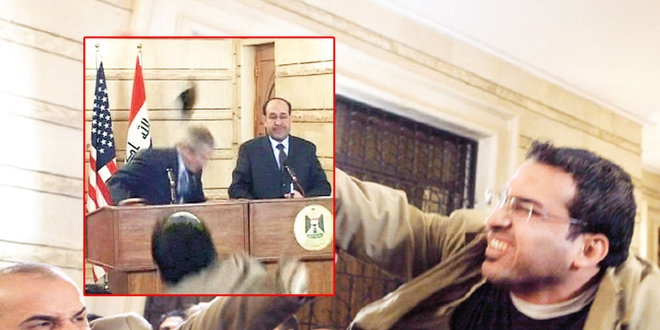Iraqi journalist throwing shoes at Bush: Who is Muntadhar al-Zaidi?
Muntazar al-Zaidi became a symbol of resistance when he threw his shoes at President Bush. No regrets over the years.

George W. Bush had just finished his last speech to the Iraqi people in Baghdad as the US President. A little over a month later, he would step down from the most powerful post in the world and hand over responsibility for the devastating war he started 5 years ago.
He shook hands with his Iraqi counterpart, and just as he was about to leave the podium, a journalist named Muntazar al-Zaidi stood up quickly.
Muntadhar al-Zaidi (born 15 January 1979) is an Iraqi broadcast journalist who served as a correspondent for Iraqi-owned, Egyptian-based Al-Baghdadia TV. As of February 2011, al-Zaidi works with a Lebanese TV channel.
"This is a goodbye kiss from the Iraqi people, push you!" shouted al-Zaidi, then threw his shoe at the American president. With his second shoe flying in a split second, he uttered these words:
These are widows, orphans, and those killed in Iraq.
Although Bush managed to dodge the ammunition, size 43.5 shoes still left a mark. Al-Zaidi has become a local hero, a worldwide celebrity, and a symbol of the anger felt by many Iraqis after their country was devastated by the American invasion. Americans in the USA got a small glimpse of this anger.
March 2023 is the 20th anniversary of the war, but Zaidi is still not ready to forgive.
“Every day, every anniversary of the invasion of Iraq, I ask myself why. I feel sad and angry. Why did George W. Bush destroy my country?” uses expressions.
Al-Zaidi said, "The occupation is over, but they left behind more corruption, more problems, and many militias. Now we have more problems every day. The US occupation has caused Iran to control Iraq. No public service, state support There is no hospital, there is no school," he says.
Al-Zaidi's protest may have seemed small, but it left a mark. Years later, he still speaks of his country's problems as one of the most memorable opponents of the war.
Throughout all these years, he has been remarkably consistent in his feelings for his country and the harms of the invasion. He had seen the invasion up close while reporting on some of the deadliest parts of the war—the civilian deaths from the American bombings and the sectarian killings that followed.
"My news focused on the victims of the occupation," he says:
I reported on the crimes of the US soldiers. Sometimes they killed people, that's what I focused on.
Al-Zaidi started working as an al-Baghdadiyya TV reporter in 2005. He was abducted by unidentified assailants in November 2007 and held for several days before being released. This was one of a series of similar attacks caused by the chaotic security environment. He was also detained twice for questioning by US forces.
Despite these events, he said, the idea of protesting Bush had occurred to him years ago. He recalled the assurances of Bush administration officials that US soldiers would be greeted with flowers.
"I wanted to tell the peoples of the world that we do not welcome the invasion with roses, on the contrary, we will welcome it with shoes," he said. In the Arab world, where showing someone the soles of their shoes was seen as a sign of deep disrespect, his protest gained cultural significance.
In the moments before he stood up that day, many thoughts ran through al-Zaidi's mind.
"I thought of my family, my friends, the people killed by the occupation. I thought of everything I couldn't do in my life," he says.
The action itself ended quickly. Al-Zaidi was knocked down by the surrounding security guards and his life changed dramatically. He was taken away and subjected to severe beatings by the staff of Iraqi President Nouri al-Maliki.
"It was a very difficult moment," he says:
They broke my nose, and my teeth, they hit me all over. They broke a chair on my back and poured cold water on my body. They beat me at al-Maliki's house for three days.
A few days later, the Iraqi judiciary handed him over, and he was eventually charged with "attacking a visiting foreign head of state".
Al-Zaidi said when he first appeared in court in February 2009, he was infuriated as he watched "that dull smile" of Bush standing next to al-Maliki. He was facing up to 15 years in prison.
At the verdict hearing the following month, a judge asked him if he was innocent. "Yes, my reaction was natural, any Iraqi would do that," he replied.
Although al-Zaidi was imprisoned for three years, his story did not end there. His imprisonment sparked a wave of support from Iraqis and the Arab world, and demonstrations were held in Baghdad and around the world for his release.
His fame grew during his time in prison. He was released from prison on September 15, 2009, after 9 months in prison, and was greeted by a crowd of family members and supporters who slaughtered sheep in his honor. He said at a press conference on the day he was released that he was tortured while in prison.
Al-Zaidi lived in Lebanon and Switzerland before returning to Iraq to contest in 2018. He served on the anti-corruption platform and promised to jail "thieving politicians" but ultimately failed.
Al-Zaidi, who lives in Baghdad today, no longer works as a journalist. Time has not softened his views on Bush or the invasion he initiated.
"George W. Bush should be in jail and the US should close the Iraqi Embassy," he says.
Asked if he would throw his shoes at Bush again if he had the chance, Zeydi replied, "He doesn't even deserve my shoes."
